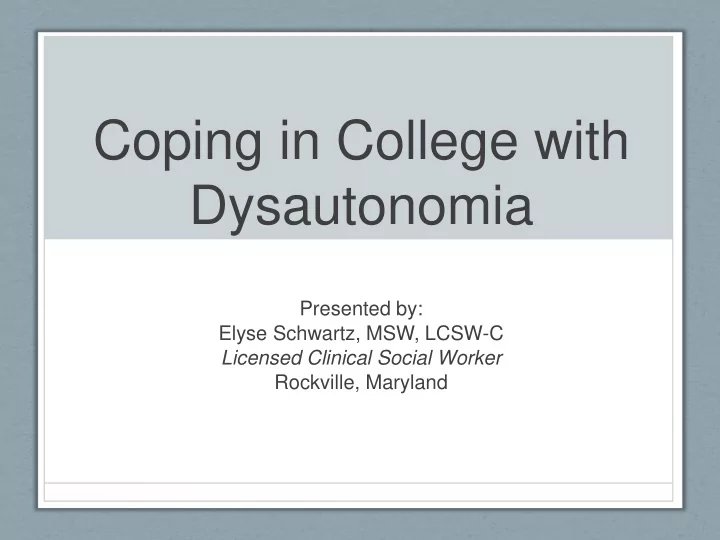

Coping in College with Dysautonomia Presented by: Elyse Schwartz, MSW, LCSW-C Licensed Clinical Social Worker Rockville, Maryland
College Planning • Tour your prospective university • Are you able to walk/manage the campus? • Is the campus housing manageable? Do you need a handicap accessible room? • Meet with an admissions counselor/representative from the disability office • Geographically, where can I manage the weather/conditions without becoming more symptomatic?
Before you leave for College • Make an appointment with your specialist(s) • Have your prescriptions filled WITH refills • Ask for copies of your medical records incase you need them • Ask for a referral for a specialist near your school • Schedule a follow up appointment for an upcoming school break
Accommodations/ The Disability Office • Good questions to ask the disability office: • Will you help me communicate my needs to my professors? • What paperwork do you need/need me to complete to be eligible for accommodations? • Have you ever accommodated another student with my illness/disability? What services were helpful to them?
Social Life/Dating • New friends • Do I tell them about my illness? • What do I need from them for support? • Be able to explain your illness to allay any fears they may have • How did you explain things to your friends at home? What worked to help them understand?
Social Life/Dating, con’t • Dating • You deserve to meet someone and be happy! • There is no perfect time to tell someone you’re dating about your illness – it’s important that it feels right to you • Adapt your dates to your health • Don’t make the relationship all about your illness
Safety Planning • Names of medications and dosages • Names of your doctors WITH phone numbers • Trusted friend with all of this information • Name of a hospital close to campus you can trust • Does my insurance cover my needs? • Does the college health center have a medical professional who understands/is knowledgeable about my illness? • What are the health center’s hours?
Self Care • Integral part of remaining healthy is to take care of yourself! • Pace yourself! • Go to bed and wake at the same time every day • Eat nutritious meals • Meditate • Consult a therapist if need be • Make exercise part of your routine
Questions? • Check out the Dysautonomia International Website – they have a wealth of information for you, your professors and university health center www.DysautonomiaInternational.org • Please feel free to call or email me: Elyse Schwartz, MSW, LCSW-C 646-221-8084 ElyseSchwartz@me.com
Recommend
More recommend